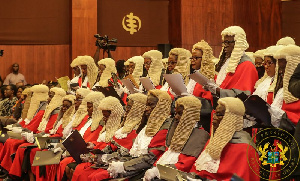The Supreme Court on Wednesday, March 9, 2022; delivered a ruling that affirmed that a deputy Speaker of Parliament retains their vote even when they are presiding over the House.
A seven-member panel of the apex court via a unanimous decision handed down the ruling which also declared parts of Parliament’s Standing Orders as unconstitutional.
The Justices who sat on the issue, according to a myjoyonline report were as follows:
Justice Jones Dotse – leader of the panel
Justice Nene Amegatcher
Justice Prof Ashie Kotey
Justice Mariama Owusu,
Justice Lovelace Johnson
Justice Clemence Honyenuga
Justice Emmanuel Kulendi
The Justice Jones Dotse-led panel by their ruling affirmed that the events of December 1, 2021 that saw Joseph Osei-Owusu, the First Deputy Speaker, count himself whiles presiding to support the approval of the 2022 Budget was constitutional.
The NDC Members of Parliament boycotted the vote that rescinded their earlier rejection of the same ballot before its approval by the Majority Group alone.
Whiles upholding arguments by the Attorney General and Minister for Justice, Godfred Yeboah Dame, the court also struck out portions of the standing orders of parliament which reads: “A Deputy Speaker or any other member presiding shall not retain his original vote while presiding.”
Background
Following controversy over the rejection and later approval of the 2022 budget by one-sided Caucuses of the 8th Parliament, a private legal practitioner, Justice Abdulai, filed a case against at the Attorney General at the Supreme Court.
He prayed the Court to interpret two Articles – 102 and 104 – of the 1992 Constitution and by so doing to declare the proceedings in Parliament on November 30, 2021, which led to the passage of the 2022 Budget and Economic Policy as unconstitutional.
He specifically cited the fact that the Presiding Speaker, First Deputy Speaker, Joseph Osei-Owusu, had counted his vote despite acting as Speaker.
However, in defence of the State, the Attorney-General, Godfred Yeboah Dame, argued that there was no express provision in the 1992 Constitution that stops a Deputy Speaker presiding over proceedings from voting or counting himself as part of MPs present to form the right quorum.
The Minority have expressly rejected the decision with Leader Haruna Iddrisu referring to it as repugnant to the provisions in Article 102 and 104.
“The Court’s ruling aptly captures the judicial support for the Electronic Transaction Levy (E-levy), for a struggling economy in destress,” he said.
“The Judiciary of Ghana is also failing Ghana’s parliamentary democracy in their inability to appreciate the true meaning of Article 110 of the 1992 Constitution that Parliament shall, by Standing Orders, regulate its own proceedings.”
 Home Of Ghana News Ghana News, Entertainment And More
Home Of Ghana News Ghana News, Entertainment And More





